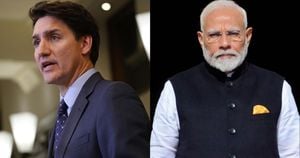Massimo Giletti's investigative program, Lo Stato delle Cose, continues to shine a light on the notorious world of football ultras, particularly focusing on the violent and controversial figures surrounding the Italian teams Milan and Inter. The airing on February 24, 2025, brought to the forefront the entangled relationships between these fan groups and organized crime, exposing shocking revelations and deep-rooted issues within Italian society.
During this riveting episode, Giletti highlighted the case of Antonio Bellocco, the former leader of Inter's ultras, who had ties to the 'ndrangheta, the infamous Calabrian mafia. Viewers were introduced to Andrea Beretta, the man implicated in Bellocco's death, who revealed shocking insights about the threats he faced within the ultras community. Beretta claimed, "Lo vengo a sapere da ‘Bello e buono’ che Marco Ferdico aveva proposto a Pinna di fare l’azione contro di me," indicating the dangerous web of alliances and betrayals prevalent among football fans.
The episode drew attention not only for its revelations about the ultras but also for its commentary on the intersections of crime and political power. Giletti's platform has proven invaluable for discussions on mob influence and corruption, making it increasingly evident just how far the roots of organized crime dig within the community. Besides highlighting the criminal aspects, the episode also delved deep beyond football, intertwining it with significant political discussions. Matteo Renzi, former Prime Minister of Italy, appeared on the show, providing stark commentary on Italy's current political climate. Giletti even presented him with bananas, joking about Renzi's previous comments equated to the 'banana republic'. "Ho un regalo per lei che però ho preso da un ‘vu cumprà'." Giletti exclaimed, provoking laughter and thought about the state of the nation.
Political analyst Alessandro Orsini argued the potential consequences of Russia’s aggressive stance toward Europe, stating, "Putin ha ucciso politicamente l’Unione Europea, e questo perché le guerre servono a confermare le ipotesi." This alarming perspective on geopolitical tensions reminded viewers of the broader impact of violence, both on the international stage and within domestic political contexts.
The discussions continued to reflect Italy's own war at home, where violence linked to the world of football mirrors larger societal issues. The dialogue took on heightened urgency as emotions flared, particularly during the intense debate between General Roberto Vannacci and MP Maria Elena Boschi over the rising influence of far-right extremism—a topic growing ever more pertinent under the current global political conditions.
Throughout the program, social media buzzed with reactions to the exchange between Boschi and Vannacci. Their heated debate illustrated the frustrations surrounding the state's mishandling of rising extremism, showing how deeply the reverberations of both crime and politics affect everyday citizens.
Fans of the show and political commentators took to social media to share their perspectives on the program, with some applauding the candid discussions, even as others critiqued Vannacci's demeanor when engaging with Boschi. Observers noted, "Giletti puoi far finire un discorso a Vannacci" and questioned the obvious biases Giletti might have shown, highlighting the stakes involved when grappling with such contentious topics on public platforms.
This latest episode of Lo Stato delle Cose emphasized the necessity to examine the intertwined worlds of sports, crime, and politics, providing layers of insight on Italy's current challenges. By unpacking the narratives within the ultras culture, Giletti's program brings forth not just entertainment but also significant discourse on the power dynamics and societal risks faced by the nation.
With the shadows of crime detailing the backend of beloved sports, the episode presents not only entertainment but poses the question: how can society engage with and combat these deeply ingrained issues? The show is clearly much more than just about football; it urges for reflection on the paths society has taken and what it can do to reverse such troubling trends.



